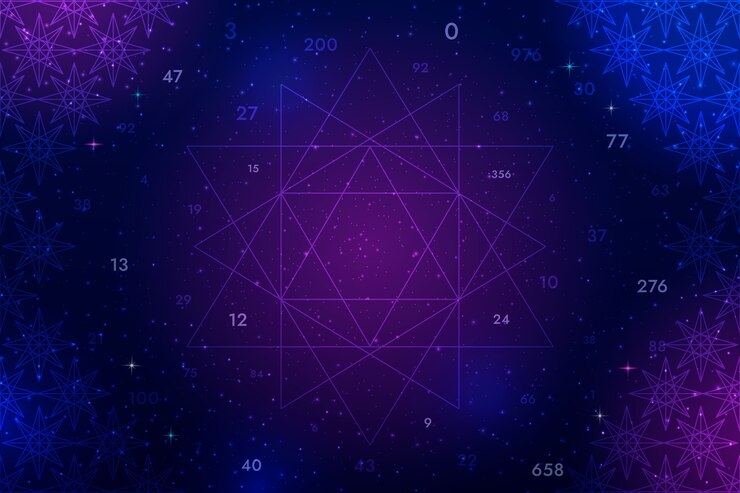
Vedic Astrology, rooted in ancient Indian scriptures known as the Vedas, is a profound system of divination that has captivated seekers of cosmic wisdom for centuries. Emerging from the Rigveda, one of the oldest sacred texts, this ancient practice seamlessly blends astronomy, mathematics, and spirituality. At its core, Vedic Astrology interprets the celestial bodies positions at the time of one’s birth to unravel the cosmic map of one’s destiny.
As perceived in this intricate system, the celestial influences extend beyond mere fortune-telling, encompassing spiritual growth and life guidance. In recent years, a global resurgence in interest has seen enthusiasts from diverse cultures seeking insights from Vedic Astrology. Thus, recognizing its timeless wisdom as a celestial compass in navigating life’s journey.
1. Fundamental Principles and Concepts of Vedic Astrology
Vedic Astrology is founded on key principles like the law of karma, reincarnation, and the interconnectedness of all living beings. The birth chart, or horoscope, is central to this practice, serving as a personalized cosmic snapshot at the moment of an individual’s birth. It maps the positions of planets in specific houses and zodiac signs.
Planetary positions signify unique energies and houses represent different facets of life. The zodiac signs, on the other hand, add a nuanced layer of characteristics. The intricate interplay between these elements forms the basis for predictions and insights into one’s destiny, personality traits, and life events. The birth chart, therefore, is a celestial blueprint offering profound revelations in the journey of self-discovery.
Further reading: Nakshatras in Vedic Astrology: The Ultimate Guide
2. Significance of Each Planet in Vedic Astrology
Vedic Astrology assigns distinct roles to each planet, attributing them specific influences on various facets of life. For instance:
- The Sun symbolizes the soul and vitality
- The Moon governs emotions and mind
- Mars denotes energy and drive
- Mercury rules intellect and communication
- Jupiter signifies wisdom and prosperity
- Venus relates to love and aesthetics
- Saturn governs discipline and challenges
- Rahu and Ketu represent karmic forces
Understanding these planetary forces allows astrologers to interpret their impact on an individual’s birth chart. Thus, offering insights into strengths, challenges, and potential life paths.
Unique Qualities and Characteristics
Each planet carries unique qualities and characteristics that shape an individual’s personality and experiences. For instance, Mars’s aggressive and assertive nature contrasts with Jupiter’s expansive and benevolent influence. Venus embodies beauty and harmony, while Saturn emphasizes discipline and responsibility.
This rich tapestry of planetary traits contributes to the intricate and nuanced predictions in Vedic Astrology. Thereby, allowing practitioners to provide tailored guidance based on the interplay of these celestial forces.
Planetary Transits and Conjunctions
The consideration of planetary transits and conjunctions heightens the dynamic nature of Vedic Astrology. Transits occur as planets move through the zodiac, impacting specific areas of life as they align with natal positions. Conjunctions, where planets come together in the same sign, intensify their combined influence. These movements are integral in forecasting significant life events, career shifts, or emotional transformations.
By analyzing these celestial movements, Vedic Astrology offers a temporal dimension to predictions. This, in turn, helps unveil the ebb and flow of planetary energies throughout an individual’s life journey.
3. The Power of Houses and Zodiac Signs
In Vedic Astrology, the birth chart (natal chart) is divided into twelve houses, each representing specific areas of life. These houses range from the self (first house) to partnerships, career, and spirituality (seventh through twelfth houses). The positioning of planets in these houses at the time of birth indicates the focus and dynamics of various life aspects.
For example, the tenth house governs career and public life, while the fifth house relates to creativity and progeny. Interpretation of these house placements allows astrologers to discern the intricate tapestry of an individual’s life journey. Thus, providing insights into their strengths, challenges, and key life events.
Twelve Zodiac Signs
The zodiac signs, also known as rashis, add a layer of complexity to Vedic Astrology, shaping individuals’ personality traits and preferences. Ranging from Aries to Pisces, each sign is associated with specific elements (earth, air, fire, water) and qualities (cardinal, fixed, mutable). A detailed analysis of the zodiac sign in which each planet is placed provides a nuanced understanding of an individual’s character.
For instance, a person with the Moon in Taurus may exhibit qualities of stability and sensuality, while Mars in Leo can contribute to a dynamic and confident demeanor.
Interactions Between Houses and Zodiac Signs
The true depth of Vedic Astrology lies in the synthesis of houses and zodiac signs. The combination of a planet’s placement in a specific sign within a particular house refines astrological interpretations.
For instance, the seventh house governs partnerships, and if Venus, the planet of love, is placed in Libra (its own sign) in the seventh house, it enhances the potential for harmonious relationships.
This intricate interplay gives astrologers a holistic view, allowing them to tailor predictions by considering the unique blend of planetary energies within the context of both houses and signs. Understanding these interactions is crucial for accurate and comprehensive astrological insights.
4. Predictive Techniques in Vedic Astrology
Vedic Astrology employs a variety of predictive techniques, with two prominent ones being dasha systems and divisional charts. Dasha systems involve planetary periods that unfold over a person’s life, each ruled by a specific planet. The divisional charts, known as Vargas, divide the birth chart into finer segments to offer detailed insights into specific life areas.
Commonly used divisional charts include the Navamsa (9th divisional chart), which focuses on marriage and spiritual aspects, and the D-10 (Dashamsha), which sheds light on one’s career.
Role in Making Accurate Predictions
Dasha systems provide a temporal framework for understanding the unfolding patterns in an individual’s life. Each planetary period or sub-period brings forth its unique influence, shaping experiences and events. The interplay of dashas and divisional charts allows astrologers to refine their predictions, offering a more granular view of specific life domains.
For example, if someone is in a Mercury dasha and Mercury is strong in the D-10 chart, it may indicate a period favorable for career advancement or intellectual pursuits. This layered approach enhances the precision of astrological insights, enabling practitioners to offer targeted guidance.
Examples and Case Studies
Consider an individual undergoing a Jupiter dasha, and Jupiter is prominently placed in the Navamsa chart. This could signify a period conducive to spiritual growth, wisdom, and possibly a harmonious phase in marriage.
On the contrary, if the D-10 chart indicates a challenging placement for Jupiter, professional aspects may be affected. By integrating these insights, astrologers can present a comprehensive analysis, guiding individuals through the intricacies of their lives.
Case studies like these illustrate how the synergy of predictive techniques refines the astrological lens, allowing for accurate and context-specific predictions that resonate with each individual’s unique journey.
Learn: How Celestial Alignments Can Guide Your Business Decisions
Summary: Vedic Astrology Demystified
In summary, Vedic Astrology helps us understand how the stars and planets influence our lives. Fundamental to this practice is the birth chart, a celestial blueprint deciphering the roles of planets and zodiac signs in specific houses. The unique qualities of each planet, combined with the nuances of houses and signs, create a cosmic mosaic guiding us through life’s journey.
Planetary transits and conjunctions add a dynamic dimension, while predictive techniques such as dasha systems and divisional charts offer temporal precision.
Vedic Astrology offers personalized insights into our strengths, challenges, and life events. As the global interest in this ancient wisdom grows, readers can explore Vedic Astrology further, unlocking the secrets of the cosmos. They can also seek guidance from expert astrologers for a more profound connection with their own unique celestial path.
Recent Posts

Aquarius Birthstone: Top Crystals and Their Healing Powers
Aryan K | March 29, 2025

December 25 Zodiac Sign: Traits of a True Capricorn
Aryan K | March 29, 2025

Find the Best Gemstones for Astrological Signs: A Comprehensive Guide
Aryan K | March 28, 2025

Exploring the Libra Personality: Traits of Those Born on September 28
Aryan K | March 28, 2025

Sagittarius Personality Explained: Traits, Love & Life
Olivia Marie Rose | March 28, 2025
Topics
- 4 Digit Angel Numbers
- 5 Digit Angel Numbers
- 6 Digit Angel Numbers
- Astrology and Birth Charts
- Business Astrology
- Career Astrology
- Celebrities and Personalities Astrological Profile
- Children Astrology
- Chinese Astrology
- Different Angel Numbers Meaning
- Double Digit Angel Numbers
- Dreams Interpretation
- Festivals
- Finance Astrology
- Find Baby Names
- Find Best Astrologers
- Gemstones and Birthstones
- Janam Kundli Chart
- Love Astrology
- Marriage Prediction Astrology
- Nakshatra (Constellations)
- Numerology
- Pet Astrology
- Rudraksha Beads
- Single Digit Angel Numbers
- Spirit Animals
- Spirituality and Positivity
- Stars, Planets and Cosmic
- Symbolism
- Tarot Cards
- Triple Digit Angel Numbers
- Understanding Hinduism
- Vastu Shastra
- Vedic Astrology
- Western Astrology
- Yoga and Meditation
- Zodiac Sign Date Calendar
- Zodiac Signs
- Zodiac Signs Compatibility
